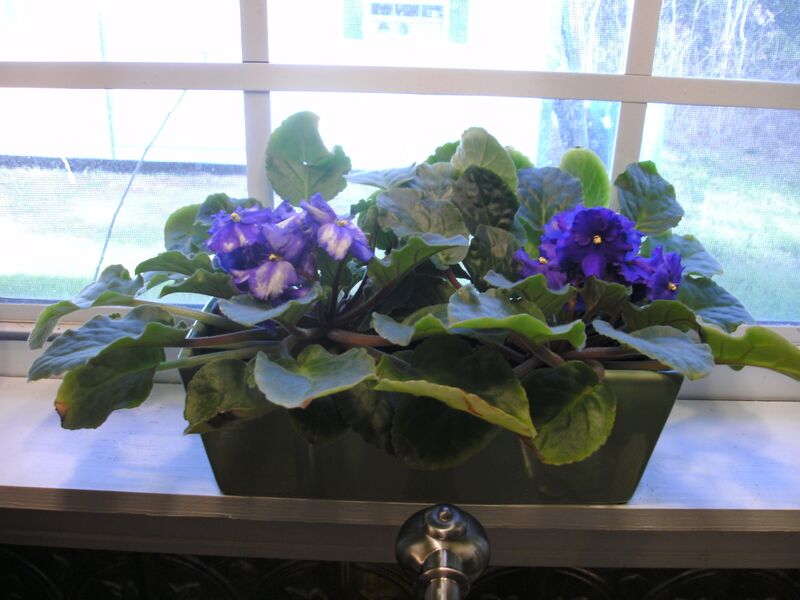How many of you are growing African Violets? Here is how. I can't grow them, but glad you can. ENJOY11/17/2023 image from Pinterest I just can’t believe it is Nov 17, less than a week Thanksgiving, and then Christmas….the amount of work we need to do to get ready for the holidays. The outside weather has been awesome so getting fall work done and ready for winter has been good. I have a tons of transplanting to do in the greenhouse with succulents and house plants. I have been working in the office and the house need to put some of that time in the greenhouse too. TOO much to do, not enough hours. Do you feel that too? Have a good weekend, and get ready for all the holidays and all that goes with it. Stay safe, enjoy.
I found this interesting about African violets as was talking to Larry’s sister, Evelyn from Aust., and how Grandma Wagner always had them in her house. My mom had some when she moved to town. BUT for me, I haven’t had any luck in raising them. HOW about you? DO you have a violet plant or two? Here is how to care for them. Maybe you get one this winter? How to Care for African Violet Plants by Catherine Boeckmann African violets are small houseplants that grow well in average house temperatures, flowering almost continuously in clusters of white, blue, or purple blossoms over fuzzy leaves. Here’s how to care for African violets in your home while they fill your home with joy. About African Violets Despite their common name, African violets are not a type of violet but produce vivid, violet-colored flowers. They are now categorized in the genus Streptocarpus. However, as their name suggests, African violets are native to East Africa, stemming from the tropical rainforests of Tanzania and Kenya. In 1892, German colonial officer Walter von Saint Paul-Illaire identified these plants and sent seeds back to Germany. African violets do best and produce the most blooms in bright, indirect light with regular house temperatures (no lower than 55F at night nor above 75F during the day). Though they are generally easy to care for, they can go through fussy spells. Don’t be discouraged! PLANTING How to Plant African Violets You can use an actual African violet potting mix or an all-purpose potting soil, as long as it is well-draining. Here’s how to create your own mix. Keep African violets planted in small pots and repot every few years to mix in fresh soil. Being a bit pot-bound encourages African violets to bloom more, so don’t be too quick to give them more space. The soil should be loose and well-drained; high organic matter content is a plus. Learn about organic soil amendments. When repotting African violets, don’t plant them any deeper than they were already planted, and be careful not to bury the crown. African violets’ stems can be susceptible to rot if kept too moist. GROWING How to Care for African Violets Watering Keep the soil lightly moist, but be careful not to overwater, as African violets’ soft stems are very susceptible to rot. Learn more about proper watering and care. Use room-temperature water, as chilled water can leave marks on the leaves. Leaves are susceptible to rot and fungal spots if kept in high humidity, so water African violets from the bottom to avoid getting excess water on the foliage. Lighting African violets prefer bright, indirect light. Avoid direct sunlight and keep them at least a few feet away from bright south- or west-facing windows. An east- or north-facing window gives them the best lighting without the risk of burning their sensitive foliage. Artificial lighting works well, too. Use fluorescent or LED bulbs to supplement natural lighting. Thin, dark green leaves and leggy stems tell you the plant is getting too little light; light green or bleached leaves indicate too much light. Fertilizing During the active growing season (spring and summer), fertilize every 2 weeks with a high phosphorous plant food. Only start to fertilize when the plant appears to need an extra boost (slow, thin growth; pale or yellowing leaves). Over-fertilizing is a more common problem than under-fertilizing, since most soil mixes come infused with plenty of nutrients. General Care Many varieties prefer warm conditions (65°F/18°C or warmer) though some are more tolerant of cooler conditions. In any case, keep them away from drafty windows in winter. Plants should be shifted to larger pots as they grow, but keeping African violets slightly root-bound can encourage them to bloom. One sign that your violet needs repotting is wilted leaves. The fuzzy leaves have a tendency to collect dust and dirt. Brush them off gently with a small, soft-bristled paintbrush. RECOMMENDED VARIETIES Hundreds of varieties and hybrids exist, from miniature violets to trailing varieties! They differ mainly in the colors of their flowers, which range from white to purple, though some varieties also have variegation in their foliage and flowers. African violets are typically classified by size, based on how wide they grow: Miniature: less than 8 inches across Standard: 8–16 inches across Large: more than 16 inches across WIT AND WISDOM Violets (Viola)—though unrelated to African violets—are one of the February birth flowers, so a potted African violet can make a bright gift for a February birthday. The violet symbolizes loyalty, devotion, and faithfulness. Find out more flower symbolism here. PESTS/DISEASES Cyclamen mites can affect African violets. They are nearly impossible to remove completely, so disposal of the infected plant and isolation of nearby plants is recommended. Spider mites can also be an issue. Powdery Mildew appears as fuzzy white blotches on stems and leaves. Various forms of rot and blight are also common. Taken from https://www.almanac.com/plant/african-violets Till next time, this is Becky Litterer, Becky’s Greenhouse, Dougherty Iowa 641-794-3337 cell 641-903-9365
1 Comment
5/20/2024 12:19:24 pm
Useful submit! I really want this sort of article.. that is very beneficial for me.
Reply
Leave a Reply. |
AuthorHi! My name is Becky and I am a Master Gardener. I own Becky's Greenhouse in Dougherty, Iowa. Archives
March 2024
Categories |
|


 RSS Feed
RSS Feed
